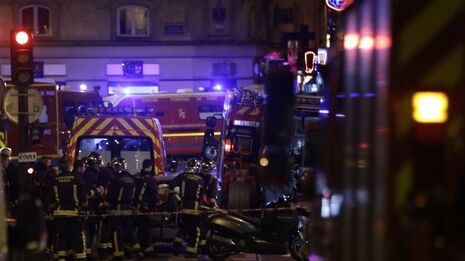We shouldn’t let Muslims become a scapegoat for terror
Columnist Millie Paine argues that we cannot blame innocent people for what happened on November 15th

The Paris terror attacks will, inevitably, go down in history. In the same vain as 9/11, the death of Diana and the tearing down of the Berlin Wall, for years to come people will recount the tale of where they were when they heard. The way my heart dropped to the pit of my stomach when I heard the news must be next to nothing compared to those who lost loved ones. It is an event akin to an earthquake, with the reverberations and aftershock being felt the world over.
Suffice it to say, my heart is with Paris at this terrible time. We, across the world, must stand in solidarity with the French. Yet it is also important to consider the profound effect these events will have upon the Muslim citizens of the West.
The role the media plays in responding to terrorism seems to be a double-edged sword. In the wake of such an evidently ideological attack, it seems all too obvious for those who are being attacked to stand together against said ideology. "We must defeat the enemy! We can’t let the terrorists win!" is the underlying message of most media outlets. And how can we? It would seem wrong, almost criminal, not to stand up against those who seem so determined to destroy the values that our Western democracies hold dear.
And yet, at the same time, by waging this ‘war’ against the attacking ideology, all we do is play into their hands. The primary aim of attacks such as those in Paris are to create fear. By creating an ‘us v them’ mentality through media frenzy and scaremongering, we help the attackers achieve their ultimate end goal, with the added side effect of ostracising an entire group of people who do not deserve our anger or our hatred.
It doesn’t take much searching to notice the tsunami of Islamaphobia that has washed over social media. Spiteful posts on far-right Facebook pages and the video clip of a woman in a hijab being pushed into a train are just instances of pure hatred at the apparent ‘enemy’. But we need to remember that these people are not representative of Muslims the world over. They are taking a religion centred fundamentally around peace, and using it as a force for evil and terror. By using the words ‘Muslim’ and ‘terrorist’ interchangeably in our dialogue, we simply fuel precisely the fear that terrorists want us to feel.
Such loaded and provocative language to describe what has happened also results in the creation of a false notion of the West as the ‘good side’, when in reality the situation is far from black and white. Despite what the media might have you believe, atrocities have been committed on all sides. The way that the events that unfolded are reported is inherently Western-centric, and our focus is inevitably on countries like France, whose practices and beliefs align most closely with ours. Their similarities with us make them relatable, and somewhat more human. But why are deaths of these innocent civilians more significant than those of Syrian people, or even the victims of other atrocities, such as those in Beirut or Palestine? Of course, the horror of what has happened in France is simply undeniable, and it is important to show our respect in a way that is unique and considerate of individual circumstances. But we cannot be lulled into the false sense of security that we are the good guys, and that the ‘other’ is bad. Such a thought is an unjust simplification of the matter.
So while our thoughts will justifiably go out to those in Paris at this time, and in particular those who have been personally affected and have lost loved ones, it is also important to stand with the innocent people who are being explicitly and unfairly blamed for a crime committed without their support or consent, purely due to their shared religion. If we don’t, all we are doing is letting the terrorists win.
 News / SU reluctantly registers controversial women’s soc18 December 2025
News / SU reluctantly registers controversial women’s soc18 December 2025 News / CUP announces funding scheme for under-represented academics19 December 2025
News / CUP announces funding scheme for under-represented academics19 December 2025 Features / Should I stay or should I go? Cambridge students and alumni reflect on how their memories stay with them15 December 2025
Features / Should I stay or should I go? Cambridge students and alumni reflect on how their memories stay with them15 December 2025 Fashion / The art of the formal outfit 18 December 2025
Fashion / The art of the formal outfit 18 December 2025 News / Dons warn PM about Vet School closure16 December 2025
News / Dons warn PM about Vet School closure16 December 2025










